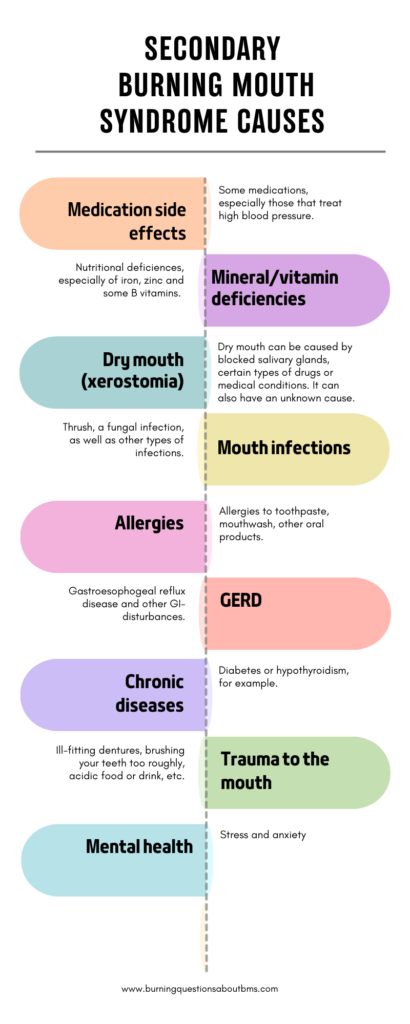Key points to know:
- No one knows what causes primary burning mouth syndrome.
- There are several causes of secondary burning mouth syndrome.
Burning Mouth Syndrome Causes
What causes burning mouth syndrome? That’s a good question and the answer depends on what type of BMS you have, primary BMS or secondary BMS.
Primary, or idiopathic, burning mouth syndrome cause hasn’t been identified yet. The most common theory is that something has gone haywire in the nerves, but nothing has been found.
If we’re taking about secondary burning mouth syndrome, there are several known or suspected causes:
- Side effects of medications, especially some that treat hypertension (high blood pressure)
- Mineral or vitamin deficiencies have caused BMS in many people. The most common ones mentioned are iron, zinc, some B vitamins (folate, thiamin, riboflavin, pyridoxine, and cobalamin)
- Dry mouth (xerostomia)
- Infections in your mouth, such as oral thrush (a fungal infection), oral lichen planus (an inflammatory condition), or geographic tongue (a benign inflammatory condition affecting the surface of your tongue)
- Allergies to certain foods or additives, like colorings, or to mouth care products (toothpastes, rinses, mouthwashes, etc.)
- Gastroesophageal reflux disease (GERD)
- Diseases such as diabetes or hypothyroidism
- Trauma in the mouth, from things like ill-fitting dentures, brushing your teeth too often or too roughly, using abrasive toothpastes or too much mouthwash, or consuming too many foods or drinks that are acidic. Some people report their BMS began after a root canal or some other type of dental work.
- Psychological issues, such as stress and anxiety
It can be frustrating not to know what the cause of your BMS is, but there are many painful conditions that have no obvious cause. For example, chronic lower back pain can be very painful. And yet, x-rays and other tests might not find any cause. The pain is real – whether it’s BMS or back pain. We just don’t know why it happens.
I created this infographic if you would like to share it. (Right click and choose “save image as” to save it to your computer.)
